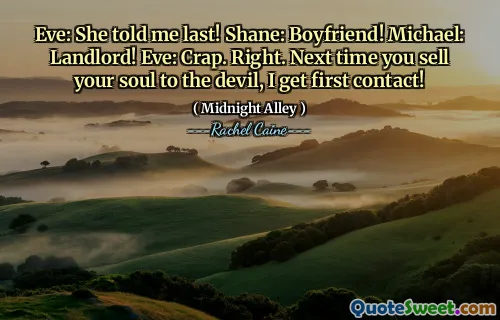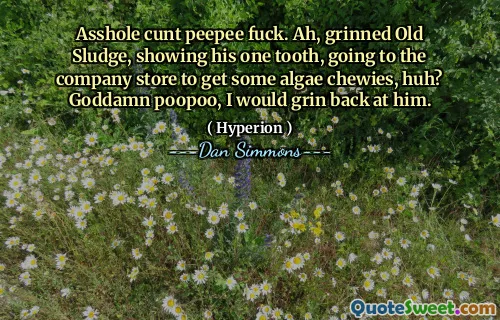
Eve: She told me last! Shane: Boyfriend! Michael: Landlord! Eve: Crap. Right. Next time you sell your soul to the devil, I get first contact!
This brief exchange between Eve, Shane, and Michael from Rachel Caine's Midnight Alley encapsulates a playful yet poignant moment that reflects larger themes of the novel. The fragmented but charged dialogue bubbles with undercurrents of tension, secrecy, and alliances shaped by supernatural or morally fraught forces, fitting well into the urban fantasy genre that Caine is renowned for. Eve's frustrated assertion about getting 'first contact' next time someone "sells their soul to the devil" is a sharp reminder of how personal relationships and power dynamics intertwine precariously in a world where deals and allegiances are anything but straightforward.
The quote presents a snapshot that is both humorous and revealing — each character symbolizes a piece of a puzzle connecting personal lives to supernatural regulations. Eve’s exasperation has a dual edge: it’s humorous as a casual complaint about being out of the loop, but it also hints at the darker realities the characters dwell with. The casual dropping of phrases like "boyfriend," "landlord," and the invocation of selling one's soul hint at complex interpersonal dramas grounded in supernatural stakes.
From a broader perspective, this conversation spotlights themes like the cost of power, trust, and communication. The cryptic banter suggests that choices come with consequences—especially when those choices involve compromising one's very essence. Eve’s demand for first contact next time underlines the importance of transparency and boundaries when navigating relationships filled with such unpredictable elements.
Furthermore, the dialogue reflects Rachel Caine’s ability to blend mundanity with fantasy, cutting through the layers of normality to expose the irrational, sometimes chaotic, nature of dealings with dark forces. The humor plays a significant role, lightening the mood but also exposing the characters’ coping mechanisms.
Overall, the quote is a microcosm of the tangled emotional and supernatural conflicts present in Midnight Alley. It resonates with readers who appreciate wit intermixed with existential dilemmas, bridging character-driven conflict with larger-than-life themes — all without losing an underpinning of relatable human frustration and desire for connection.




